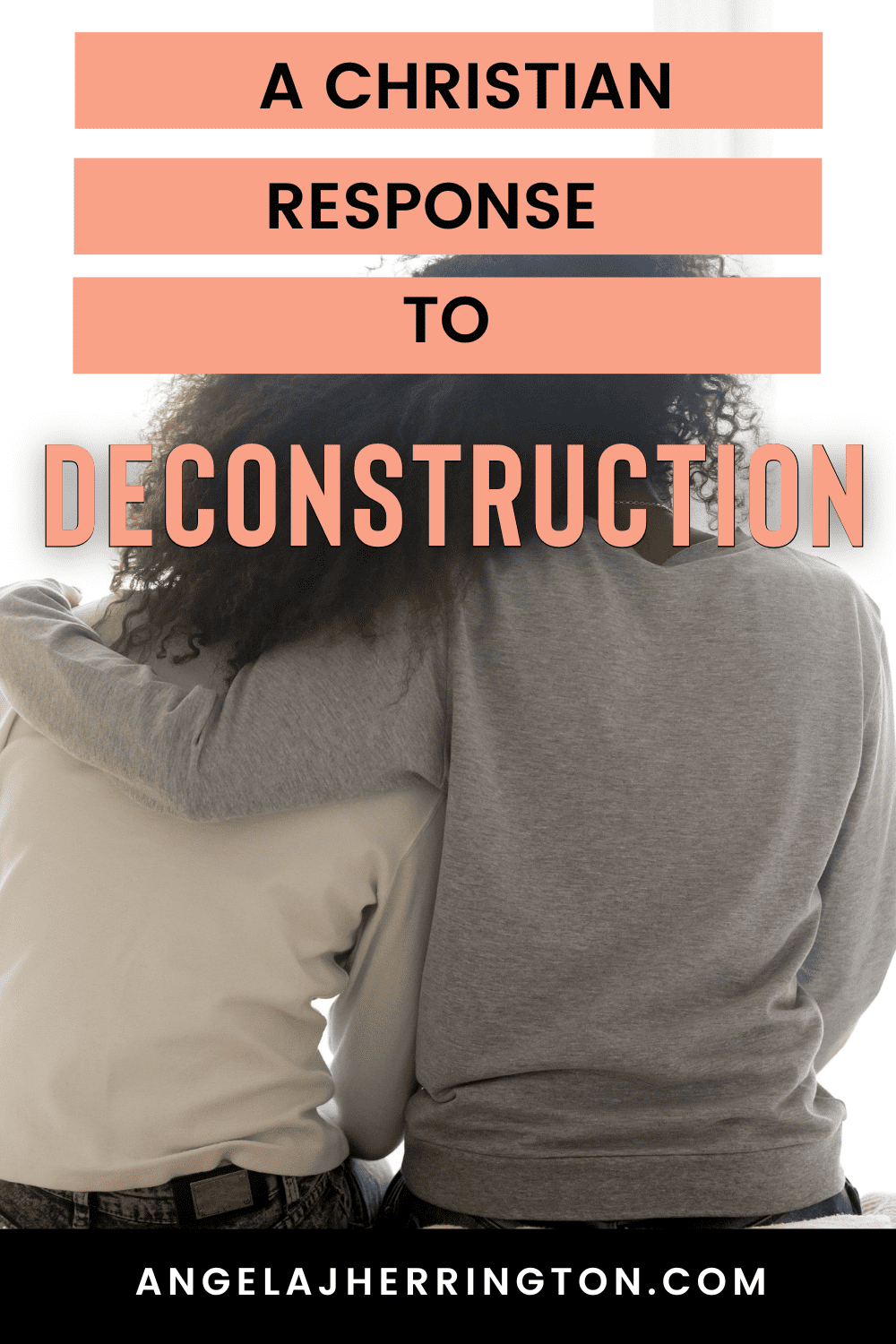Do you have someone in your life who is deconstructing, and you aren’t sure how to handle it?
Do you just know they’re condemned to hell, and are totally on the wrong path?
As much as you fear faith deconstruction, your fear shouldn’t be driving your conversations with someone who is deconstructing their faith. Are you wondering what is the proper way to have a Christian response to deconstruction? I honor the trust it takes to really listen and I know how hard it is, because I’ve gone through it myself. My deconstructing faith journey has led me toward more love, less judgment, and more grace for myself and others. Why? Because even though there was a tremendous backlash when I began sharing my deconstruction journey publicly, there were a few people who didn’t flinch.
Fortunately, a few key mentors were willing to get into the trenches with me and help me figure things out.
I had a few courageous peers willing to be honest when they were just as confused as I was. I also had a household full of people willing to let me figure things out, even if it scared them to death that I might lose my faith.
On the opposite end of the spectrum were several spiritual mentors who criticized, then abandoned me during my deconstruction.
When I began publicly speaking out against racism and called Christians to become anti-racism activists, they attacked me online. Their formerly kind and encouraging words became condescending, judgmental, and just plain mean.
There were also many ‘good church people’ who simply didn’t show up at all.
They weren’t harmful, but they weren’t exactly helpful either. If I’m being candid, I shed tears over it because many friends in that group just didn’t seem to notice how badly I was struggling. I chalked it up to everyone’s busy life, but it still hurt.
With the growing number of people speaking openly about their faith deconstruction, there’s a high probability you know someone who is wrestling with what they believe. Every Christian has the opportunity to bring support and bring healing or be angry and do more harm.
I know it can be tricky, but trust that talking and responding to those deconstructing their faith in a posture of open hands will lead to healing, understanding, and real conversations. It’s crucial to understand deconstruction and learn how to respond with compassion and humility.
Here are four tips for a Christian Response to deconstruction that will give you the most opportunity to be supportive, encouraging, and present with people who are deconstructing:
Tip 1: Listen to them without defending what you believe or want for the person deconstructing their faith.
Because here’s the hard truth about other people’s spiritual lives: what you feel, believe, or want, doesn’t matter.
Faith is a personal choice and needs to be treated that way. So if you want to be supportive, you have to throw your agenda out the window and start by being fully present and invested in listening. (If you feel objections rising and want to start throwing out scripture that says we need to coax people toward God, I’d highly recommend checking out how Job’s friends responded with a bunch of advice that was neither kind nor helpful).
I would challenge every Christian to examine their assumptions regarding deconstruction and the people who choose it. It can often feel like a Christian response to deconstruction can come from a defensive place rather than an open one. If you assume the questions they ask are guaranteed to move them away from God, you are limited in the support you can offer. In fact, by discouraging people from asking questions and seeking sacred truths, you’ll reinforce their fears about what it means to be a Christian.
By saying questioning, challenging, and wrestling with messy questions about the church is off-limits, you only increase the likelihood they will leave.
Tip 2: Don’t assume people prefer sin and are just lazily walking away from their faith.
It is a tragic error to assume that any Christian questioning the unhealthy parts of the church has already lost their faith, yet Christians do this all the time.
The people I see deconstructing their faith want to get away from belief systems that have already taken the focus off of Jesus and instead push harmful false doctrines into the world that only create pain.
Many still want Jesus; it’s the false doctrines they don’t want. The goal is to get those things out of the way so they can move back toward God and still feel relatively safe.
Judging, shaming, and gaslighting people who’re deconstructing only reinforces the belief that the church, and you, are not worth trusting.
Of the thousands of people I’ve spoken to (or chatted online with) about their desire to deconstruct their faith from toxic religion, only a few have wanted to move away from God altogether.
Those who do, tend to be deeply traumatized by church people and told their abuse was God’s will. So their desire to disconnect is 100% justified.
Instead of judgment, people who have been deeply harmed by the church could use a little encouragement that it’s possible to create a flourishing spiritual life, whatever that looks like to them.
Tip 3: Your perspective is just that, YOUR perspective.
This step in this process is acknowledging that your experience doesn’t represent everyone else’s, or even the best, right, or most sacred experience.
So you’ve got the fight the urge to center your story and convince people that theirs is wrong or a one-off anomaly that doesn’t represent what happens in most Christian spaces. The heart of any faith discussion should always be the ability to choose what our own spirituality looks like, even if that means not having any at all.
Christians who have not yet experienced a complex, often traumatic season that pushes them to challenge the toxic religion in their lives must resist the urge to write off those who have.
We must all challenge the privilege of being so wrapped up in our current level of belonging and influence that there’s no reason to call out the genuine harm the church does to a large portion of the population.
Only when those remaining in the church are willing to challenge the “that’s not how we do it here” mindset will they ever truly represent Christ.
Tip 4: See people as people, not projects.
My fourth and final tip for creating a Christian response to deconstruction that is healthy for those deconstructing their faith is to stop seeing people as broken and needing saving.
As long as you believe your mission is to deliver a truth that others cannot find on their own, you are raising yourself as an idol, exaggerating your power over other people, and upholding toxic systems and harmful religious hierarchies Jesus clearly never set out to protect. Shifting the agenda to what you believe people need.
The bottom line here is…Just Dont.
Don’t pretend you know exactly what other people are going through.
Don’t assume you have the answers they need.
Don’t center your story in other people’s lives.
Because those things don’t support other people, they just build up your ego and put self-righteousness on display.
The bottom line is that Deconstruction isn’t the shortcut or the easy way out that critics make it out to be.
It’s a sacred, holy wrestling and the courageous people who take it on, deserve to be supported and celebrated.
Hungry for more? Here are a few popular faith deconstruction related posts you’ll find helpful:
What Does it Mean to Deconstruct Your Faith?
Sometimes You Have to Leave the Church to Find God
Is Deconstructing Your Faith Biblical?
8 Reasons Why Christians Should be 2SLGBTQIA+ Allies
Deconstructing While Parenting
How to Get Out of Toxic Religion
The Best Faith Deconstruction Conferences & Online Summits
Deconstructing Your Faith When Your Partner Isn‘t
The Best Books for Deconstructing Your Faith




Angela is a Faith Deconstruction Coach and host of The Deconstructing Faith Summit who helps people break free from toxic religious culture & empowers them to recover from #churchhurt. She has led online ministries for a decade, enjoys working with clients 1:1, in groups, and is a dynamic conference speaker. She’s a Lark’s Song Certified Life Coach who reaches thousands of people in 40+ countries each month on Facebook, IG, Twitter, Pinterest, and her blog.
She’s a firstborn, Enneagram 8, Gen Xer who loves to question everything. She holds a BA from Indiana Wesleyan and a Masters in Leadership from Wesley Seminary. Her graduate research project focused on leadership development and opportunities for Gen X women in the US church.
Angela and her unique online ministry are featured in Lyz Lenz’s 2019 book God Land: Story of Faith, Loss, and Renewal in Middle America. She has published articles in Hope for Women and HOPE is Now magazines. She has been featured in The New Republic, Publisher’s Today, and Religion News Service.
Her first book, Deconstructing Your Faith Without Losing Yourself, Will be published by Eerdmans in February 2023.
Angela is also a wife, mom to 5, and a proud resident of Marion, Indiana with her family when they’re not traveling the US in their RV.





